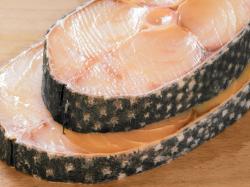Australian Heard Island & McDonald Islands Patagonian Toothfish Fishery Gains MSC Certification
March 21, 2012 | 4 min to read

The Australian Heard Island and McDonald Islands (HIMI) Patagonian toothfish (toothfish) fishery has gained Marine Stewardship Council (MSC) certification following a rigorous, independent assessment against the MSC standard for sustainable and well-managed fisheries.
The fishery has demonstrated the toothfish stocks being targeted are healthy, its fishing practices have minimal impact on the marine eco-system and overall the fishery is well managed.
Products from this fishery may now bear the MSC ecolabel, identifying their origin from a sustainable source. Only products that originate from the certified fishery are eligible to bear the MSC ecolabel.
About the fishery
The fishery operates in sub-Antarctic waters within the Australian EEZ around the Heard Island and McDonald Islands Plateau. It is managed by the Australian Fisheries Management Authority (AFMA) and is subject to stringent management arrangements.
The certification covers the two longline vessels and one trawl vessel operated by Austral Fisheries and Australian Longline – responsible for landing 2459mt of toothfish in 2010 – and also covers an additional quota owner Better Choice Seafoods.
Management of the fishery is based upon the precautionary approach adopted by the Commission for the Conservation of Antarctic Marine Living Resources (CCAMLR).
Harvest strategies developed for this species are consistent with this approach, with current catch levels set at 2730 mt annually.
Stock assessments in this fishery are carried out annually and current assessments estimate the stock levels at approximately 63% of the original biomass – well above the target level of 50% of original biomass.
Management by AFMA, incorporating CCAMLR conservation measures in the fishery, includes approaches to avoid the capture of seabirds such as closed seasons, mandatory streamer lines and line weighting, along with two full time government-approved observers of fishing activities to report on activities, and undertake research during every trip to the HIMI fishery.
Furthermore, participants in this fishery must satisfy strict requirements to lessen environmental impacts including a ban on plastic bait bands, a ban on plastic products being discarded at sea, bans on discharge of offal and foodstuffs, and the reporting within 24 hours to authorities of any lost fishing gear and other non-biodegradable materials.
Further management actions required by certification
As part of the certification requirements, five conditions (or required management actions) have been specified to ensure the fishery continues to achieve global best practice across all aspects of its performance.
These management actions have been agreed by the client and concern the setting of precautionary harvest control rules and demonstrating management objectives have been met, ensuring the stock assessment is appropriate for the entire stock and for future catches across this stock, the collection of data on the impacts of operations on different habitats and the enhancement of consultation processes with interested stakeholders.
What the fishers say:
David Carter, CEO of Austral Fisheries, says: “The certification of the Australian HIMI Patagonian toothfish fishery to the rigorous MSC standard is a great result, and is evidence of our commitment to legal, sustainable and healthy fisheries.”
"It is recognition of the collaborative work done by Australian government, industry, conservation groups and CCAMLR in ensuring the fishery is well managed and sustainable."
"This collaborative working has led to the elimination of illegal fishing in the fishery, strict management measures being put in place to limit the number of vessels allowed to operate and the setting of target species and bycatch limits and seasonal closures. They have also led to the establishment of one of the world’s largest Marine Protected Areas to further protect biodiversity in the area.”
Les Scott, MD of Australian Longline, says: “MSC certification means our fishery has been independently assessed as being sustainable and its impacts on the surrounding ecosystem have been effectively minimised.
"To ensure this is the case we have committed to effective and stringent seabird mitigation requirements, satellite monitoring of our vessels, taking part in scientific research programs, government onboard observation and detailed reporting on catches. We have also committed to comprehensive annual reviews by CCAMLR to ensure sustainable management is being undertaken.”
Frank Musumeci, CEO of Better Choice Fisheries, says: “Better Choice Fisheries is proud to be associated with fisheries that are helping to safeguard seafood stocks for the future. From an industry perspective, seafood buyers are increasingly asking about the source of the seafood they purchase, as consumer demand for sustainable seafood grows. Having the MSC ecolabel on these toothfish products assures supply chain buyers and consumers that the product is independently certified as being from a sustainable source.”
What the MSC says:
Pat Caleo, MSC Manager (Australia and New Zealand) congratulates the fishery on achieving certification, saying: “Both Austral Fisheries and Australian Longline continue to show real commitment to undergoing independent assessment of their fishing practices, and to ensuring sustainable management of the fisheries they’re involved with.”
“Management of this fishery follows precautionary and ecosystem-based principles. Strict harvest control rules, annual stock assessments, mandatory observation of fishing activities and controls on gear to minimise impacts on the ecosystem are just some of the practical outcomes of this approach.”
“This is one of several Austral Fisheries and Australian Longline fisheries to have engaged with the MSC program, with their Australian mackerel icefish fishery first gaining certification in 2006, and their Macquarie Island toothfish fishery presently undergoing assessment.
They are both involved with other fisheries, and are seeking to include them in the MSC certification program as well. Both organisations should be commended for their proactive stance in seeking independent, third-party certification of their sustainability.”
Source: Marine Stewardship Council
